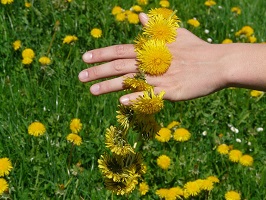
During a national emergency, you may not have access to traditional food sources. The grocery store might be empty, the drug store could shut down, and general access to vitamins and medicine could be curtailed. Unfortunately, very few Americans are self-reliant when it comes to their health. We rely on doctors, pharmacists, and grocers to keep us fit.
What if none of that was available? Would you know what to do?
One of the best ways to stay healthy during an emergency is through herbs. These plants grow in forests, flatlands, and even in your own front yard. Many are rich in nutrients and have vital healing powers.
Here’s a list of some common healing plants you may need to scrounge for.
- Dandelions. Most people think of dandelions as an irritating weed, but their leaves are very healthy for you. Dandelions are great for curing stomach aches and constipation. They can also help with more drastic problems with digestive organs, as well as with gallstones. Mix about one ounce of leaves with one pint of boiled water for the full effects.
- Chamomile. The flowers of chamomile are very versatile herbs with several uses. Moderate doses can cure indigestion, flatulence, and headaches. Chamomile is also a mild sedative. Other studies have found that chamomile is an anti-histamine and a good eye-wash for conjunctivitis (“pink eye”). Mix about half an ounce of chamomile flowers with one pint of boiled water.
- Birch. The effects of birch bark don’t have many scientific studies backing them up. But in an emergency, birch is easy to come by. Birch bark is historically a very common cure for fevers and rheumatism. Mix one ounce of the leaves and bark with one pint of boiled water.
- Black Walnut. The inner bark of black walnut is thought to have healing properties. During the Revolutionary War, it was commonly used as a laxative. The Chinese have used it to cure everything from asthma to sexual impotence. The oil of the fruit is supposedly an effective anti-parasite – good if anyone develops a tapeworm. Modern science has found black walnut to have anti-cancer properties. Mix one teaspoon of the inner bark with 1.5 pints of water. Slow boil the mix for half-an-hour.
- Thyme. Thyme is a popular spice backed up by modern science, which has found that it cures colic, flatulence, and other stomach problems. Thymol, the active principle within thyme, can be applied to the body for immediate bloodflow, which can help fight inflammation. Historically, thyme has also been used to cure all types of coughing, including asthma. Mix approximately half an ounce with a pint of water.
- Slippery Elm. The bark of slippery elm is very powerful thanks to mucilage-containing cells. Slippery elm is particularly useful for sore throats and coughing. It can also be used as a laxative and an enema. Mix one teaspoon of bark with 1.5 pints of water and slow boil for half an hour covered.
- Seaweeds. There are several types of marine plants that have healing properties. One of the most useful (and common) is Brown Kelp. Seaweeds are an alternative treatment for cancer, particularly those anywhere in the digestive system. They can also be applied to treat skin condition and other wounds. Generally the whole seaweed plant is eaten. No known seaweed is poisonous or toxic, although it might contain creatures that are.
- Parsley. Who knew this popular cooking herb had such great properties for women? Parsley has traditionally been used to regulate menstrual flow. The Russian medicine “Supetin” – comprised of 85% parsley juice – can stimulate uterine contractions during labor. Parsley has also been used to help with liver diseases, although the effects of this have never been verified. Mix one ounce of leaves with one pint of boiled water.
- Marigold. Believe it or not, this common flower has healing properties. It’s a natural antiseptic that can be used to treat cuts, bruises, and burns. Studies have shown marigold can also help lower blood pressure. Mix one to four grams of granulated flowers with a cup of boiling water.
